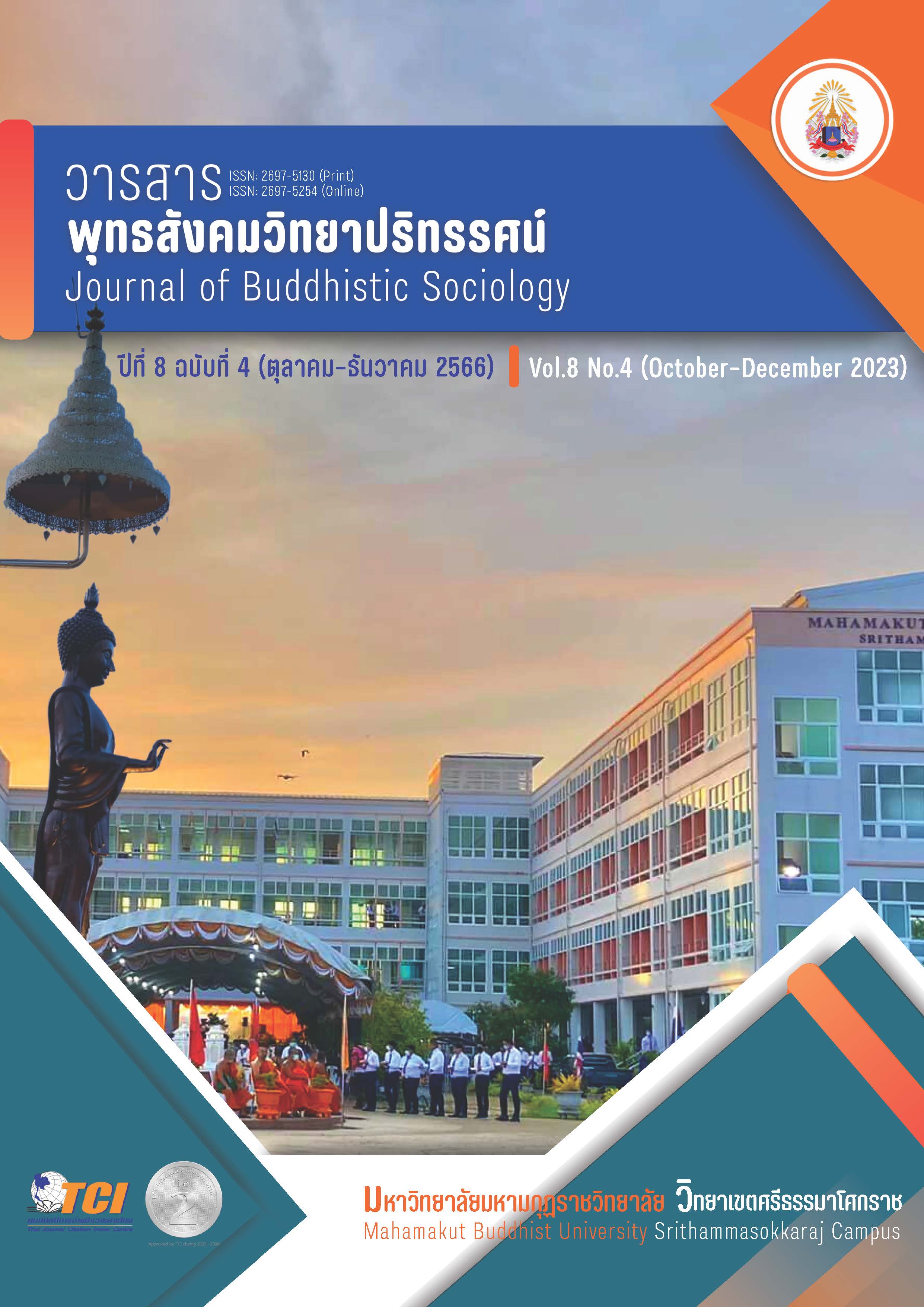A RESPONSIBILITY MORAL DEVELOPMENT SYSTEM FOR CENTRAL REGION VOCATIONAL STUDENTS: A CASE STUDY OF KEOWALIN BUSINESS ADMINISTRATION TECHNOLOGICAL COLLEGE
Main Article Content
Abstract
This research aimed to 1) assess the need for developing an ethical and moral development system on responsibility aspect, 2) develop an ethical and moral development system on responsibility aspect, 3) suggest and certify the concept of ethical and moral development system on responsibility aspect, and 4) test the efficiency and evaluate the quality of the system by experts of ethical and moral development system on responsibility aspect for vocational students in the Central Region: a case study of Keowalin Business Administration Technological College. It was research and development. The research sample selected by purposive sampling was students of Kaewalin Business Administration Technology College in Vocational Certificate Level 1-3 and Higher Vocational Certificate Level 1-2, totaling five classrooms with 82 students. The research tools included the interview form and questionnaire to assess the need for developing an ethical and moral development system on the responsibility aspect, including the evaluation form of system efficiency. The quality of the research tools was inspected by finding the Index of Item Objective Congruence (IOC) of questions and objectives by five experts. Statistics used included percentage, mean, standard deviation, and the reliability of the questionnaire.
The results showed that:
1. Overall, students' need to develop a moral and ethical system on responsibility was at the highest level. To develop morality and ethics in self-responsibility, the students were diligent and determined to study. For family responsibility, the students knew their responsibilities to their families. For social responsibility, the students behaved under society's laws, rules, and regulations
2. Overall, the moral and ethical system development level in responsibility was high. The students tried to complete their assigned tasks until they achieved their goals. They were ready to help when others requested or saw they needed help. The students had self-confidence as a person with good responsibility.
3. For suggestions regarding the development of morality and ethics in responsibility, there should be activities to promote and develop morality and ethics on responsibility for students to carry out daily until it becomes a good character trait. There should also be positive reinforcement for students and cooperation between homes, communities, and schools to develop students' morality and ethics. Moreover, everyone in society should be a good example and role model for students.
4. The average value of system efficiency testing after doing the activities was 80.07, higher than the average before, 87.16. When considering the t-value of 25.71, the critical value at the significance level of .05, and the Sig. value of .00, less than the specified value, the efficiency after doing the activity for developing morality and ethics on responsibility was higher than before doing the activity. For the evaluation and certification of the system for developing morality and ethics on responsibility by the experts with the average score of 4.20-4.80, the experts had the opinions that "A System of Developing Morality and Ethics on Responsibility for Vocational Students in the Central Region: A Case Study of Keowalin Business Administration Technological College" had the highest level of suitability and the conclusion was this the system was well suitable.
Article Details

This work is licensed under a Creative Commons Attribution-NonCommercial-NoDerivatives 4.0 International License.
References
เกสรา ศักดิ์มณีวงศา. (2561). การเตรียมความพร้อมให้กับองค์กรยุคดิจิตอล. กรุงเทพมหานคร: ดีลอยท์ ทู้ชโธมัทสุ.
ชัยนนท์ นิลพัฒน์. (2555). ความหมายของจริยธรรม. นครปฐม: มหาวิทยาลัยศิลปากร.
ชัยยงค์ พรหมวงศ์. (2554). ระบบสื่อการสอนสำหรับการศึกษาขั้นพื้นฐาน. นนทบุรี: สาขาวิชาศึกษาศาสตร์ มหาวิทยาลัยสุโขทัยธรรมาธิราช.
ทิศนา แขมมณี. (2562). ศาสตร์การสอน (พิมพ์ครั้งที่ 23). กรุงเทพมหานคร: จุฬาลงกรณ์มหาวิทยาลัย.
พรณรงค์ สิงห์สำราญ. (2550). ความหมายของคุณธรรมจริยธรรม. กรุงเทพมหานคร: วิทยาลัยนอร์ท กรุงเทพมหานคร.
สำนักงานเลขาธิการสภาการศึกษา กระทรวงศึกษาธิการ. (2560). แผนการศึกษาแห่งชาติ พ.ศ. 2560–2579. กรุงเทพมหานคร: พริกหวานกราฟฟิค.
พระไตรปิฎก ฉบับภาษาไทย (2536), ฆราวาสธรรม 4, กรุงเทพมหานคร: โรงพิมพ์มหาวิทยาลัยมหาจุฬาลงกรณราชวิทยาลัย


